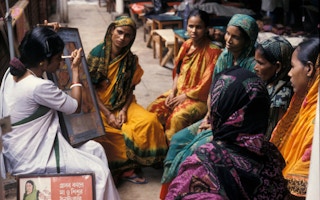This month, the United Nations General Assembly will hold a high-level meeting to secure a commitment by member states to deliver universal health coverage (UHC), including financial risk protection and access to essential health-care services, medicines, and vaccines for all.
But just how much countries commit to services that meet the unique needs of girls and women as part of their UHC implementation is still up for debate.
By adopting a political declaration on UHC, countries are agreeing to allocate funding from their national budgets to create a future in which diabetics everywhere get insulin, HIV isn’t left to ravage communities, and all children receive essential vaccinations.
In that future, even the most vulnerable communities would have reliable and affordable access to the services they need, and the entire society would be healthier and more productive.
And yet the unique health needs of girls and women, not least their sexual and reproductive health needs, remain a matter of political contention, which has long caused their health care to be undervalued and under-resourced.
In humanitarian settings, for example, there is very little access to sexual and reproductive health care. And in many places, young people have difficulties exercising their reproductive rights.
Undermining women’s health further, women are often under-represented in medical trials, leading to inadequate diagnosis and treatment of diseases.
Even programs that are intended specifically to serve adolescent girls are often designed without meaningful youth engagement; as a result, they often fail to meet their target users’ needs and, at times, even reinforce damaging stigmas.
“
For universal health coverage to be truly universal and transformative, it must embrace gender equality in all forms.
But for universal health coverage to be truly universal and transformative, it must embrace gender equality in all forms—and that also means providing explicit guarantees of sexual and reproductive health and rights (SRHR).
This includes modern contraception, pre-and post-natal care, infertility treatment, safe abortion, and prevention and treatment of sexually transmitted infections and cancers of the reproductive organs. It also includes the right to consent to sex and to be safe from intimate partner violence.
These health services save lives. If the need for modern contraception were met in developing regions, and women and newborns received essential care, unintended pregnancies would drop by 75 per cent, maternal deaths would decline by 73 per cent, and newborn deaths would drop by 80 per cent.
Vaccinating girls against the human papilloma virus (HPV) would avert more than three million deaths from cervical cancer over the next decade in 72 low- and middle-income countries. And, of course, healthier mothers have healthier children.
Protecting women’s health and guaranteeing their autonomy over their own bodies, sexuality, and fertility is the bedrock of gender equality. SRHR enables women to reach their full potential by, among other things, participating in their economies, politics, and societies.
This boosts the wellbeing of families and communities, thereby contributing to overall economic growth and sustainable development.
Despite these enormous benefits, experience suggests that unless SRHR is explicitly protected in UN declarations, it is likelier to be left out of policy deliberations and budgets.
Ensuring such protections is an uphill battle, because conservative UN member states push to strike words like “gender” and “sexual and reproductive health and rights,” and sometimes even “human rights,” from various international declarations.
There is a war of words being fought in the multilateral system, and women’s bodies are the battleground. That is why the Alliance for Gender Equality and UHC—which comprises more than 100 civil society organisations from 46 countries—has been calling on UN member states not to allow a victory for those seeking to undermine women’s health and rights. The deletion of these words has very real consequences.
“Health care for all” includes sexual and reproductive health, and “all” includes every person, regardless of race, ethnicity, age, ability, migration status, gender identity or expression, indigeneity, health condition, class, or caste. To have any chance of delivering this, SRHR must be recognized, funded, and manifested in every country and community in the world.
The fight now moves from words on a page to action. If governments are serious about UHC, they must commit to building and funding comprehensive health-care systems that work for all people, including girls and women. The result will be a healthier, wealthier, and more equal world.
Katja Iversen is President and CEO of Women Deliver, a global advocate for gender equality and the health and rights of girls and women.
Copyright: Project Syndicate, 2019.
www.project-syndicate.org











